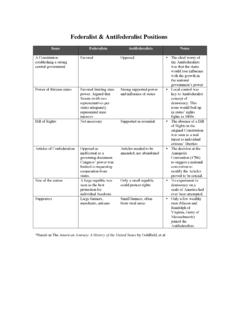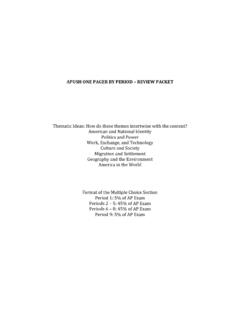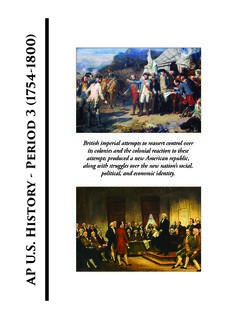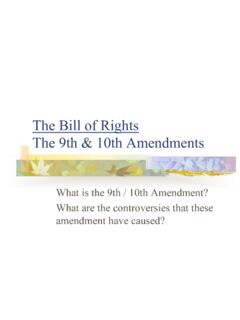Transcription of APUSH Period 1-5 Timeline
1 APUSH Period 1-5 Timeline . Chronological sequencing is the ability to arrange historical events in the correct order. Below is a list of significant events/periods in American History. Add additional notes to help you understand the major historical events and trends from 1491-1877. 1491: Pre-Columbian Exchange: Native American diversity 1492: Columbus discovers the New World 1588: St. Augustine (Spanish 1st in North America). 1607: Jamestown (English colony). 1608- Quebec (French colony). 1607-1700s: English, French, Spanish, Dutch colonization New England, Middle, Southern (Chesapeake), West Indies Periods of salutary neglect 1676- Bacon's Rebellion 1680- Pueblo Revolt 1700's: Colonial development 1730-50's: Great Awakening 1754: Start of French & Indian War (7 Years War in Europe).
2 1763: End of the French & Indian War No more salutary neglect, mercantile laws, taxes 1763-1775: Tension colonies and mother country Proclamation of 1763, Quartering, Stamp, Tea Acts, etc. 1775: Eve of Declaration of Independence Lexington and Concord 1776: Declaration of Independence Thomas Paine's Common Sense 1776-1783: American Revolution Battle of Saratoga (1777), French treaty (1778), Treaty of Paris (1783). 1787: Constitutional Convention Goodbye articles of confederation 1789: New government under Constitution George Washington becomes President, Bill of Rights 1790s: 1st party system Federalist vs. Democratic Republicans Hamilton vs. Jefferson, National Bank, tariff, Kentucky & Virginia Resolution 1800: Thomas Jefferson elected 1st peaceful transition of power 1800's-1860: Market Revolution 1803: Louisiana Purchase 1812-1814: War of 1812.
3 Hartford Convention (1814). 1814-1824: Era of Good Feelings (Or was it really?). Clay's American System, 2nd BUS, Tariff of 1816. 1820: Missouri Compromise 1820-1860: Sectional conflict western expansion + slavery in territories = drama 1823: Monroe Doctrine 1828-1836: Andrew Jackson: Age of Common Man & Age of Reform Nullification Crisis (1833), Trail of Tears (1838-39). 1828-1854: 2nd party system (Whigs vs. Democrats). 1845-1849: Polk presidency Manifest Destiny (Texas, Oregon, CA, & more). 1846-1848: Mexican American War 1848: Seneca Falls Convention 1850: Compromise of 1850. 1850's: Sectional Crisis Fugitive Slave Act (1850), Kansas Nebraska Act (1854), Dred Scott (1857), Bleeding Kansas, etc. Post 1854: 3rd Party system (Republicans vs. Democrats). 1860: Lincoln Elected Secession begins 1861-1865: Civil War Battle of Antietam (1862), Emancipation Proclamation (1863).
4 Post 1865: Reconstruction 13-15th Amendments 1877: End of Reconstruction- Jim Crow, sharecropping, etc.








